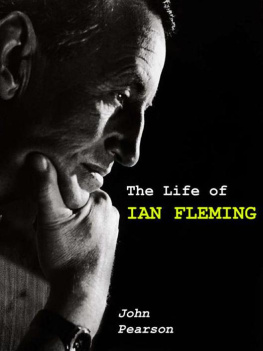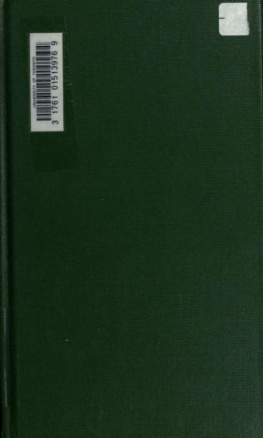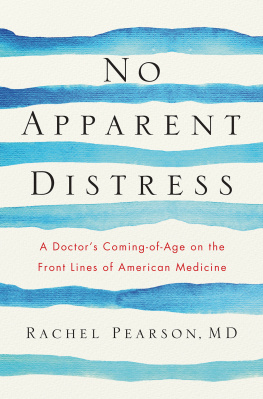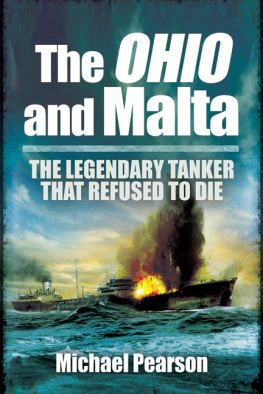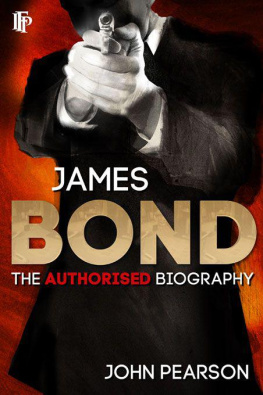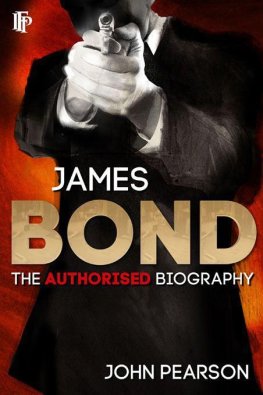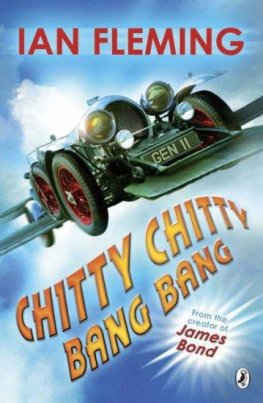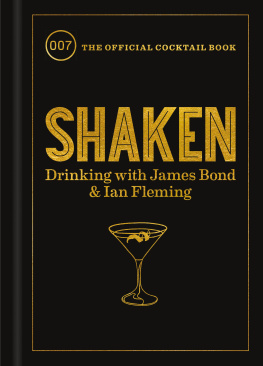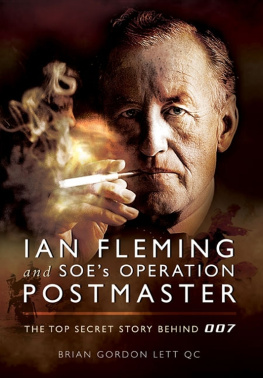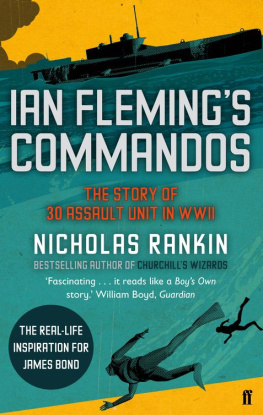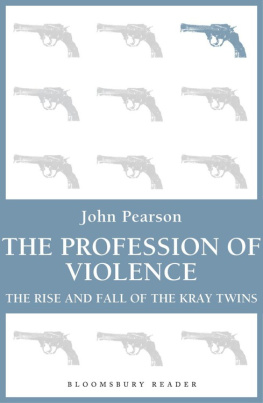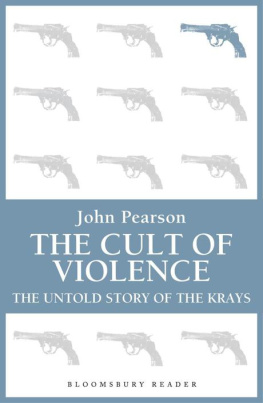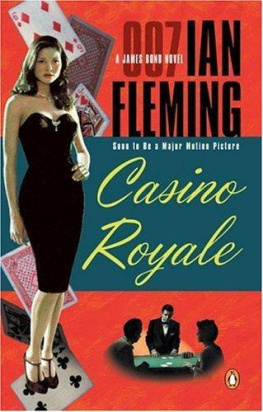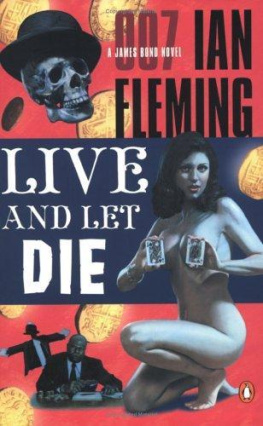Pearson - The Life of Ian Fleming
Here you can read online Pearson - The Life of Ian Fleming full text of the book (entire story) in english for free. Download pdf and epub, get meaning, cover and reviews about this ebook. City: S.l, year: 2013, publisher: Bloomsbury Reader, genre: Detective and thriller. Description of the work, (preface) as well as reviews are available. Best literature library LitArk.com created for fans of good reading and offers a wide selection of genres:
Romance novel
Science fiction
Adventure
Detective
Science
History
Home and family
Prose
Art
Politics
Computer
Non-fiction
Religion
Business
Children
Humor
Choose a favorite category and find really read worthwhile books. Enjoy immersion in the world of imagination, feel the emotions of the characters or learn something new for yourself, make an fascinating discovery.
- Book:The Life of Ian Fleming
- Author:
- Publisher:Bloomsbury Reader
- Genre:
- Year:2013
- City:S.l
- Rating:4 / 5
- Favourites:Add to favourites
- Your mark:
- 80
- 1
- 2
- 3
- 4
- 5
The Life of Ian Fleming: summary, description and annotation
We offer to read an annotation, description, summary or preface (depends on what the author of the book "The Life of Ian Fleming" wrote himself). If you haven't found the necessary information about the book — write in the comments, we will try to find it.
Pearson: author's other books
Who wrote The Life of Ian Fleming? Find out the surname, the name of the author of the book and a list of all author's works by series.
The Life of Ian Fleming — read online for free the complete book (whole text) full work
Below is the text of the book, divided by pages. System saving the place of the last page read, allows you to conveniently read the book "The Life of Ian Fleming" online for free, without having to search again every time where you left off. Put a bookmark, and you can go to the page where you finished reading at any time.
Font size:
Interval:
Bookmark:
The Life of Ian Fleming
JOHN PEARSON
First published by Jonathan Cape Ltd 1967
To the memory of Leonard Russell,
who guided, edited, inspired and shaped this
book, and but for whom
Introduction
Back in 1965, when I started work on this biography, Ian Fleming had been dead less than a year. Sean Connery had made the first two Bond films, Dr No followed by From Russia with Love, which ironically was released a fortnight after Ians death. And at that point, no-one, not even the most devoted Bondophile, would have predicted eighteen more successful films to come, and that Ians creation would become the most famous secret agent in the world and the most profitable serial figure in the history of the cinema.
When I knew him, Ian Fleming was one of the last people you would ever think of achieving this sort of immortality. I first met him when he offered me a job on what now seems the prehistoric Sunday Times, providing material for the Atticus column he edited. I was in my early twenties, he in his mid-forties. I recall the slightly shiny lightweight navy-blue suits, the dark-blue-and-white-spotted bow ties and the sad, sardonic smile as he clenched the Dunhill holder between his battered teeth, and drew heavily upon his umpteenth Morlands Special of the morning.
In the office he was always something of a loner, and known also as a book collector and a dedicated golfer. He enjoyed a privileged position in the office, and by midday Friday no sooner was his copy put to bed for that Sundays edition than he was off in his sleek black Thunderbird, speeding down the road to Sandwich, and looking forward to his first round of golf on what he called the best golf course in the world, St Georges. Unlike anyone else on the paper, he played bridge with the proprietor, Lord Kemsley, and the manner in which he had stolen the wife of another press grandee, Lord Rothermere, placed him in a social stratosphere way above us humbler hacks. Over his private life he maintained the reticence of the ageing womaniser he was, but never more so than on the subject of his true relationship with James Bond, which to me was always something of a mystery.
Take his explanation that he came to write Casino Royale while on holiday in Jamaica to take his mind off getting married for the first time at the age of 43. Writing a bestseller at breakneck speed may have fitted in with some Old Etonian ideal of effortless excellence but, as I learned when researching this biography, it simply wasnt true. Ian had been secretly planning the book for years, and Casino Royale involved several months of serious revision before he considered it fit for publication. As for the character of Bond, the truth was more complicated than he ever cared to say or than I entirely realised when I wrote this book.
I now believe that, far from Casino Royale being a sudden tour de force written as a sort of marital therapy, Ian was actually creating Bond in an attempt to ward off a profound mid-life crisis. As this story of his life makes clear, his natural reserve concealed a deeply discontented man who always felt that, as a younger son, life had stacked the odds against him. The hero father, killed on the Somme when Ian was nine; the rich, dominating mother; and the brilliant older brother, Peter Fleming: all had left him with a set of high ideals against which he could only fail. Even his acclaimed war service in naval intelligence had failed to satisfy him. As Deputy to the Director of Naval Intelligence, he knew all about action but was never really part of it. He was the man behind the desk who sent younger men off to kill and be killed in the line of duty. This troubled him and left him with the secret fear that, unlike those brave young men and his own heroic father, he lacked physical courage and the killer instinct.
The truth was that, by the time the war had ended, there was something intolerable in Ians situation. Here he was in his late thirties, outwardly the most enviable of men a handsome, heterosexual bachelor with influential connections in society, journalism, the City of London and the secret service world in Britain and America. He had even bought himself the perfect haven to escape to, that tiny private cove in Jamaica where he built himself a typically spartan holiday house, which he called Goldeneye.
But none of this resolved his problems. He needed money. He refused to return to his old job as a City stockbroker. His attempt to create a foreign news service to rival Reuters, where he had also worked before the war, failed to produce the fortune he had hoped for, and he settled for his job on the Sunday Times instead. At the same time he was involved in his star-crossed love affair with Ann Rothermere and, as she was pregnant with his child, he had agreed to marry her when her divorce came through. It was out of this uneasy combination of circumstances that James Bond was born.
As I discovered, during his boyhood Ian had formed the habit of escaping from the world by immersing himself in old-style thrillers like Sappers tales of Bulldog Drummond and the Richard Hannay stories of John Buchan. Now he was doing something similar with the Bond books, except that he was no longer an adolescent reader but a middle-aged author with a wartime experience of the secret service world. As an author, he was at liberty to dream up his own plots, dominate his hero, treat his women as he wished, survive the most appalling situations and eliminate any villain of his choosing. Even his lurking doubts about his personal courage could be overcome. In his books, by taking on the guise of Bond, he could imaginatively embark upon the most hazardous of missions, armed with little more than bravery, resourcefulness and that all-important licence to kill which Commander Ian Fleming RN had never actually enjoyed in real life.
By creating Bond, this complex man had turned his daydreams into fictional reality, and in the process he had hit upon the perfect alter ego for himself to make the dissatisfactions of his life bearable and even exciting.
During the six years following Casino Royale, when he wrote his most memorable books, Ian was at his happiest, as he lived two separate lives the daily round of an unhappy marriage and the exciting Walter Mitty world he escaped to in the person of James Bond. And during these six brief years Bond was Ians slave and faithful friend. They travelled together, saw and relished life together and, as he went on writing his books about him, Fleming naturally endowed this alter ego with an increasing number of his own prejudices, tastes and secret longings. These included his decidedly old-fashioned attitudes to politics and women, his worship of the Royal Navy and, despite his admiration for America, his unshakeable conviction that Britain would always be the most important country in the world.
During their early years together, Agent 007 upgraded and enhanced Ians everyday existence. Throughout his life Ian had always been trying to ward off chronic boredom. Now, by making Bond his ally and travelling companion, he not only had the perfect cover for going anywhere he liked in order to research Bonds next adventures, but he also suddenly possessed an extra pair of eyes, through which he was discovering a wonderfully exciting world around him.
Once he was with James Bond, the familiar casino at Le Touquet was transformed into that place of life-and-death adventure he described in Casino Royale; Saratoga Springs with its mud baths and its race track became the sinister world of Diamonds are Forever, and a short trip they made to Istanbul together turned into an exploration of the struggle with a Russian hit-man that became the climax of From Russia with Love.
Suddenly the world was almost everything Ian had dreamed of, and I now believe it was this close identification he had with Bond that helped to make the early books the classic thrillers they are. I also think it was his deep involvement with his hero that made him so extraordinarily cagey on the subject. I remember after I had read Live and Let Die saying to him what a great film it would make.
Next pageFont size:
Interval:
Bookmark:
Similar books «The Life of Ian Fleming»
Look at similar books to The Life of Ian Fleming. We have selected literature similar in name and meaning in the hope of providing readers with more options to find new, interesting, not yet read works.
Discussion, reviews of the book The Life of Ian Fleming and just readers' own opinions. Leave your comments, write what you think about the work, its meaning or the main characters. Specify what exactly you liked and what you didn't like, and why you think so.

